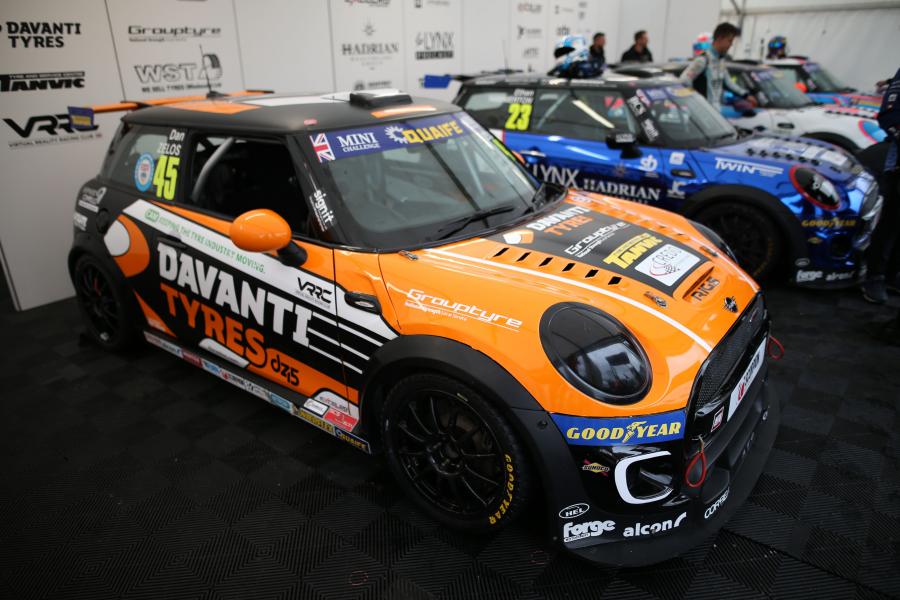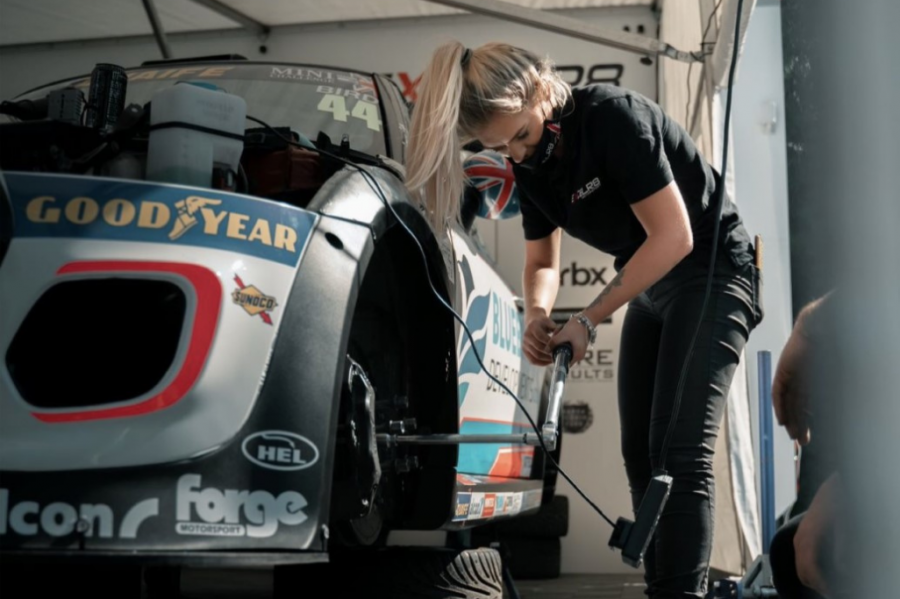From accountancy to engineering, Charley Webster-Clarke’s path to being a number two technician is certainly an unusual one. She is now part of EXCELR8 Motorsport’s MINI CHALLENGE team, working for the squad at British Touring Car Championship events. We spoke to her to find out what the job involves and how you can switch careers with the right dedication.
What is the role of a number two technician?
The main thing is to follow what the number one technician asks of you. One thing I’ve learned is you can be as involved as you want to be. I’ve found at EXCELR8, the more I ask, the more I learn.
Some of the main tasks are fuelling, cleaning, brake pad changing, jacking up the car, and doing the wheel changes. When you spread that over all the team’s cars, you’re surprised by how busy that keeps you for a weekend – people don’t realise, until you’re here, how much is involved. For example, we do about 100 wheel changes a day.
How do you become a number two technician?
I feel my route has been a little bit different. I already knew Andy [Menzies, team manager, who is involved in the University of Derby’s motorsport course] at EXCELR8 through university and he offered me the opportunity based on my dedication and passion. It’s not an easy industry to crack. A lot of people tend to do volunteering and ask for opportunities just to get their foot in the door. If it’s a passion, you don’t see it as a weekend of work – it’s more play than it is work.
Motorsport is competitive from start to finish, people are angling for the job roles but if you can get your foot in and prove yourself, it’s not so hard. I’ve got no work experience – anything I know is from my own builds. It really doesn’t matter where you come from – my background is accounting. You don’t have to go to university, you can come from the industry, you can come from motoring or you can come from nothing relatable at all. As long as your heart’s in it, it really doesn’t matter.

What other skills are useful?
You need to be very forward thinking because things are constantly changing and you also need to be quite innovative and adaptive. You need to be motivated – if you’re not dedicated and motivated, you won’t put up with the hours on race weekends. I think the main thing is dedication. If people can see your passion and your heart in it, you will get opportunities.
What does a race weekend look like for you?
I usually get here on a Thursday afternoon, by which time the awning set up is nearly done and I would help finish any set up. We usually get back to the hotel at 7/8pm at night.
On Friday, we’re usually at the track from 7am and we do any final car preparation, check the camber, check the toe, set the suspension clicks. It’s probably the hardest day because you’re in the pitlane and the drivers want as much time on track as they can get to optimise their set-up and feel comfortable in the car, so everything is so quick. We probably change wheels four or five times. As number two, when the driver comes in, your role is jacking the car up and then assisting with the wheel change.
Once we come in from FP1, I jack the car up onto axle stands, we remove the bonnet and put a cover over any exposed items that may give away vehicle set-up. We drain the fuel, log the fuel used and then refuel ready for the next session. You have to clean the car and help with any changes to the set-up, brake pad changes and brake bleeds and obviously check over the car. The air filters need cleaning and it’s the same after FP2. All the cars will also go onto a flat patch after each session to make sure the set-up is exactly as we want or make any changes the engineers ask for. Friday is usually an 8pm or 9pm finish.
The Saturday is a lot more stressful. Starting at 7am, we’re doing any final preparations to the cars, doing the engine and gearbox checks and set-up. When the drivers are out in qualifying, we have a run plan to follow and we are egging them on from the pitwall. It’s then back to the awning and it’s time to check the cars over again and prepare them for the first race. The drivers give a lot of feedback and they might want to make adjustments.
There’s often a lot of contact during the races so there might be some bodywork repairs to do or vinyl wrapping or stickers to replace. The evening finish tends to be a lot later – we start leaving at maybe 8pm or 9pm, but sometimes it’s 10pm. On my first weekend, the number ones stayed late to do an engine swap. I stayed behind that day to observe but I learned a lot.
On Sunday, it’s the same process all over again until the end of the final race when we start to pack down. On a Sunday, I’m usually on my way home by 8pm. But it’s never the same – as much as it’s very repetitive work, it’s never the same race weekend. When you get into it, and things start happening, it’s such a different ballgame to what it looks like on paper.

How many other people are involved in the team?
We have the team principal and team manager/engineer and two data engineers. There’s a number one technician per car and we usually have six cars across two awnings. There’s a head technician for each awning, who also do the gearbox and differential rebuilds and oversees parts. There’s then one number two technician per two cars – I’m with Dan Zelos and Jason Lockwood this season. There’s also a tyre engineer and assistant per awning.
Your job role is what you’re prepared to take on. If people don’t help out, and are not working as a team, then things will fall apart. Once I’ve finished my tasks, I’ll help out elsewhere as needed.
Do you think more women should get involved in these roles?
It’s a massive shame there’s not as many women. Any woman who wants to do it, even if they haven’t worked in the automotive or motorsport industry, don’t let it stop you. I’m 25 and I spent seven years doing accounting.
You will get stronger every weekend. I take my hat off to everyone at EXCELR8 because of the patience they’ve had. As long as you’ve got those key traits of passion and dedication, that’s most important. Even if you’ve got a career in place, if you truly want to do this, it’s not too late. Everyone should be doing what they want – you need to chase and believe in your dreams.
